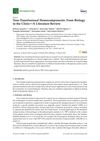9 citations,
August 2021 in “International journal of molecular sciences” PPARγ is essential for maintaining healthy skin, controlling inflammation, and ensuring proper skin barrier function.
317 citations,
April 2018 in “Journal of steroid biochemistry and molecular biology/The Journal of steroid biochemistry and molecular biology” PCOS is a complex condition in women that can lead to health issues, and lifestyle changes are the best management approach.
1 citations,
July 2021 in “IntechOpen eBooks” Environmental factors can cause mutations in skin proteins, leading to skin disorders.
 8 citations,
June 2021 in “International Journal of Molecular Sciences”
8 citations,
June 2021 in “International Journal of Molecular Sciences” Exosomes from umbilical cord cells fix hearing loss and damaged ear hair cells in mice.
 4 citations,
June 2021 in “Dermatology”
4 citations,
June 2021 in “Dermatology” Scientists created a 3D skin model to study a chronic skin disease and test treatments.
83 citations,
August 2018 in “BJOG” Uterine transplants for transgender women are feasible but need more research.
 2 citations,
March 2021 in “Journal of Cosmetic Dermatology”
2 citations,
March 2021 in “Journal of Cosmetic Dermatology” Umbilical cord-derived media is safe and effective for hair growth.
 1 citations,
August 2023 in “International journal of pharmacy & integrated health sciences”
1 citations,
August 2023 in “International journal of pharmacy & integrated health sciences” Cosmeceuticals are popular for their skin health benefits and anti-aging effects.
 39 citations,
October 2013 in “Plastic and Reconstructive Surgery”
39 citations,
October 2013 in “Plastic and Reconstructive Surgery” Human alpha defensin 5 helps heal wounds, reduce bacteria, and grow hair on burned skin.
1 citations,
February 2023 in “Ibrain” Black cumin and its nanoformulations show promise in treating neurodegenerative diseases.
 January 2025 in “AAPS PharmSciTech”
January 2025 in “AAPS PharmSciTech” Transethosomes improve drug delivery through the skin and show promise for treating various conditions.
 98 citations,
July 2014 in “Trends in Molecular Medicine”
98 citations,
July 2014 in “Trends in Molecular Medicine” Hair follicles are hormone-sensitive and involved in growth and other functions, with potential for new treatments, but more research is needed.
9 citations,
May 2021 in “BioMed research international” Human hair-derived particles can effectively carry and release the cancer drug Paclitaxel in a pH-sensitive manner, potentially targeting cancer cells while sparing healthy ones.
58 citations,
March 2011 in “Pflügers Archiv für die gesamte Physiologie des Menschen und der Tiere/Pflügers Archiv” Hormones and signaling pathways control sebaceous gland function and could help treat acne.
 46 citations,
April 2008 in “Archives of Dermatological Research”
46 citations,
April 2008 in “Archives of Dermatological Research” Substance P may worsen acne by increasing inflammation, but corticosteroids might help by reducing this effect.
 12 citations,
March 2018 in “Bioengineering”
12 citations,
March 2018 in “Bioengineering” The document concludes that products like PRP and PRF show promise for tissue healing, but evidence of their effectiveness is inconsistent.
29 citations,
February 2011 in “PloS one” Astressin-B can reverse and prevent hair loss in stressed mice.
19 citations,
July 2020 in “EBioMedicine” A gene variant increases the risk of a type of hair loss by affecting hair protein production.
110 citations,
April 2020 in “Advances in Wound Care” Nanotechnology shows promise for better chronic wound healing but needs more research.
 June 2024 in “International Journal of Nanomedicine”
June 2024 in “International Journal of Nanomedicine” CRISPR/Cas9 has improved precision and control but still faces clinical challenges.
29 citations,
June 2020 in “International Journal of Molecular Sciences” Notch signaling disruptions can cause various skin diseases.
136 citations,
September 2019 in “Journal of Clinical Investigation” Dermal adipose tissue in mice can change and revert to help with skin health.
 26 citations,
January 2016 in “Annals of Dermatology”
26 citations,
January 2016 in “Annals of Dermatology” Ecklonia cava polyphenols help increase human hair growth and reduce hair loss.
 32 citations,
July 2001 in “Endocrine Practice”
32 citations,
July 2001 in “Endocrine Practice” Insulin-sensitizing drugs like metformin can help with ovulation, weight loss, and lower testosterone in some women with PCOS.
 April 2018 in “Journal of Investigative Dermatology”
April 2018 in “Journal of Investigative Dermatology” IL-17C is important in inflammatory skin diseases and could be a target for treatment.
 April 2018 in “Journal of Investigative Dermatology”
April 2018 in “Journal of Investigative Dermatology” Cutaneous lupus patients have higher levels of certain immune cells in their blood and skin.
 26 citations,
December 2020 in “Nature metabolism”
26 citations,
December 2020 in “Nature metabolism” Rapamycin treatment helps with mitochondrial disease by reducing PKC levels.
 139 citations,
December 2020 in “Cell Stem Cell”
139 citations,
December 2020 in “Cell Stem Cell” Male hormones affect COVID-19 severity and certain drugs targeting these hormones could help reduce the risk.
 30 citations,
April 1997 in “European journal of endocrinology”
30 citations,
April 1997 in “European journal of endocrinology” The document concludes that managing hirsutism involves identifying the cause, using a scoring system for severity, combining cosmetic and medical treatments, encouraging weight loss, and providing psychological support, while noting the need for more research on drug treatments.
31 citations,
November 2020 in “International journal of molecular sciences” Adipokines affect skin health and could be targeted for treating skin diseases.
















